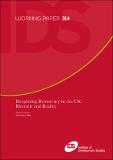| dc.description.abstract | Increasing concern about the quality of democracy has prompted efforts in many
countries, ‘developed’ and ‘less developed’, to ‘deepen democracy’ by increasing
the opportunities for citizen participation. One such country is the UK. Over the
last decade, the government has introduced a number of policies designed to
promote greater participation. However, research in Moulsecoomb, a relatively
deprived area of Brighton, raises doubts about the capacity of these policies to
have a significant impact on the quantity or quality of participation, and in
particular about the chances that they will bring about the change in the balance
of power between citizens and the state that is implicit in the concept of
‘deepening democracy’. Similar findings emerge from studies in other parts of the
country.
The gap between rhetoric and reality appears to be due to a number of interrelated
factors, notably inadequate political motivation, the high degree of
government centralisation, the inherent limitations of the ‘invited spaces’ for
participation that are central to such policies, and lack of pressure from below.
Underlying all these factors are fundamental issues of power, including not just
‘visible’ power, but also ‘hidden’ and ‘invisible’ power. Invisible power appears to
be particularly important, since many of the obstacles to effective participation are
deeply embedded in the UK’s ‘institutional culture’, which affects state and citizens
alike.
In many respects, the UK experience is not unusual. Attempts to deepen
democracy in less developed countries have encountered similar problems.
However, because of the ‘cultural’ obstacles, the prospects for deepening
democracy in the UK appear to be particularly bleak, at least at present. This
does not mean either that the current policies are pointless or that one should not
continue to strive for more citizen participation in the UK. However, it does
suggest the need to be realistic about the nature and extent of change that is
currently possible.
Keywords: democracy; participation; local governance; democratisation. | en_GB |

